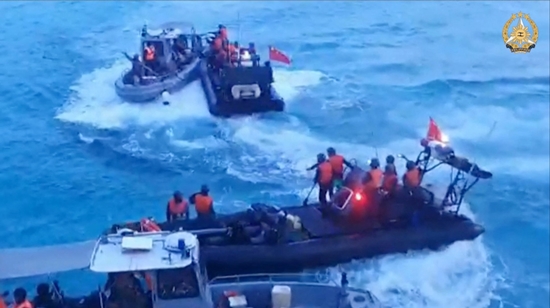
After the Philippines demanded P60 million (60 million Philippine pesos or a little more than $1 million USD) in compensation for China’s recent acts of belligerence against Philippine vessels in the South China Sea, China doubled down on its dull-witted dissimulation.
It’s the Philippines that should face consequences for “its” actions, says Mao Ning, a spokesperson for the Chinese Foreign Ministry (“China to PH: Face the consequences of your actions,” Manila Bulletin, July 4, 2024).
Sovereignty?
“The Philippine vessels were carrying out an illegal resupply mission which violated China’s territorial waters and staging a provocation when they were stopped by China Coast Guard, who acted lawfully and rightfully to defend China’s sovereignty.”
Only by arbitrary declaration can China’s causing trouble in waters right next to the Philippines be a matter of “defending China’s sovereignty.” By the same reckoning, China could and perhaps secretly does assert “sovereignty” over the entire globe.
Try dialogue and consultation in future, suggests Ning; that’s “the right track of properly handling differences.”
If the Philippines were to begin asking China for specific permissions to let Philippine vessels move around in Philippine waters, this kind of “dialogue and consultation” would imply that China properly controls chunks of the exclusive economic zone of the Philippines. China would thus be gaining territory whether the response it deigns to make to any particular request is “Yes, your Philippine vessel may move from point A to point B” or “No, your Philippine vessel may not move from point A to point B.”
So, no, a “difference” about whether Philippine boats and ships may move around in Philippine waters cannot be resolved by consultations with a Chinese government continuing to assert, in rationalizing attacks by Chinese vessels on Philippine vessels, that Philippine vessels have no business moving around in Philippine waters.
Meanwhile, ABS-CBN News reports, “Department of Foreign Affairs (DFA) Secretary Enrique Manalo on Thursday said talks on the management of maritime disputes between the Philippines and China are making progress following the resumption of the Bilateral Consultation Mechanism on the South China Sea (BCM) on July 2.”
Leave, Filipinos say
And, per Inquirer.net, a recent survey by Pulse Asia “survey by Pulse Asia showed that a large number of Filipinos favored a diplomatic solution to the maritime dispute between the Philippines and China in the South China Sea.”
A majority said that the way for China to “ease the tension” between China and the Philippines is for China to “agree to a code of conduct to govern actions” of the countries that have competing claims in the South China Sea. Sixty-one percent want China “to ‘remove’ its coast guard and maritime militia vessels from Philippine waters and the country’s exclusive economic zone (EEZ).” What do the other 39 percent want?
Only 8 percent want the Philippines government to ask the U.S. for military help in fending off China’s aggression.
Also see:
StopTheChinazis.org: “Japan to the Rescue in the South China Sea?”
“Manila’s position is also puzzling. It takes a hard line itself on ownership of disputed islands, and it is matching Chinese military presence with a military presence of its own. What exactly is it negotiating?”





